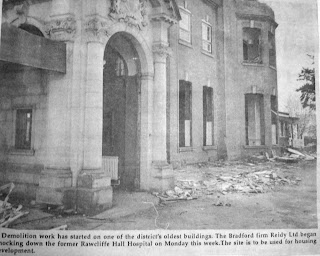Some of the bees are soon moving to their second home where they have access to the Himalayan Balsam [ aka Impatiens glandulifera or Policeman's helmet] flowers on the banks of the Ouse. Bees love gathering nectar from the flowers and as the plant flowers on until the first frosts it is also loved by beekeepers.
We are particularly keen to give our bees access to it as we have split our colonies and now have four hives of bees which need to build up their numbers before winter. Over the last few weeks we have been selling some of our set honey by putting it out on a table in the front porch. It seems popular and is good for anyone local with allergies as local honey can help them build up an immunity apparently.
I have been buying a few postcards recently - mostly of local places such as Airmyn, East Cowick and Bubwith but one I could not resist was of a hamlet called Brigham not far from Driffield. My father's family are from the area and it is a lovely picture of the canal with a little bridge over it.
Nest week I hope to see some of you who read my blog. Our annual local history exhibition will be at Junction in Goole from next Tuesday 9th August. There will be displays of old pictures connected with local hospitals, framed local prints which have been restored and coloured for sale and material connected to the Somme and the First World War.
We are there for almost two weeks so come and have a look and say hello.
 |
| One of our bees visiting a perpetual sweet pea flower in the garden |
 |
| Checking the bees, with smoker at the ready |
 |
| Rawcliffe Hall, once home of the Creyke family and later a hospital was demolished in 1994 |

